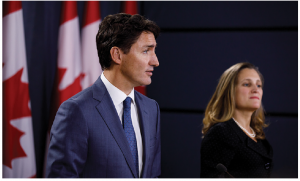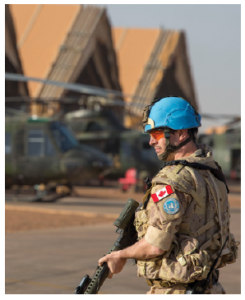
Foreign policy won’t be a federal election issue during the 2019 campaign, although it should.
To be sure, there may be a leader’s debate about foreign policy as there was in the 2015 election. But foreign policy is generally not a do-or-die, make-or-break issue with Canadians. Like voters pretty much anywhere, they are preoccupied with concerns closer to home, such as jobs, the health of the economy, national unity, and whether or not they trust their leaders. But how our government manages its international relations, especially with the United States and China, will increasingly affect Canada’s prosperity and future.
Historically, there are some notable exceptions in which broader foreign and security concerns defined election outcomes. The 1988 federal election was fought over the fate of the just-concluded free trade agreement with the United States. Going into that election, it looked as though Brian Mulroney’s Conservative government, which had sealed the deal, would lose resoundingly against Liberal leader John Turner, who came out swinging against it. Mulroney was able to turn the tide by doggedly making his case that the agreement was in Canada’s best interest.
Another Conservative prime minister, John Diefenbaker, was not so lucky. In 1958, Diefenbaker agreed to let the Americans station their nuclear-armed, surface-to-air Bomarc missiles on Canadian soil to defend North American airspace against Russian bombers. When details of the secret deal were leaked, the ensuing hue and cry caused Diefenbaker to renege. His clumsy about-turn proved fatal. His own cabinet split over whether Canada should honour its Norad commitment to take the missiles and their nuclear warheads. Diefenbaker was forced to call an election in 1963, which he lost to Lester B. Pearson, who agreed to honour the commitment.
In 2019, there are no such politically defining international issues on the election agenda, with the possible exception of immigration. But that doesn’t mean there is nothing to talk about or that voters should blithely ignore what their leaders have to say about foreign policy and international affairs. Here are some of the questions that Canadians might want to put to their leaders before they head to the polls.
What is the CUSMA game plan?
On Nov. 30, 2018, Canada, the United States and Mexico signed the Canada-United States-Mexico Agreement (CUSMA) to replace the 1994 NAFTA (North American Free Trade Agreement) in Buenos Aires, where the countries’ leaders were attending the G20 summit. In 2017, total trilateral merchandise trade (the total of each country’s imports from one another) was nearly US$1.1 trillion. Total merchandise trade between Canada and the United States has more than doubled since NAFTA’s signing, while trade between Canada and Mexico has grown nine-fold.
However, none of the three countries has taken steps to ratify the new agreement and Canada won’t ratify until the U.S. does. In the U.S., the agreement is sidelined by Congress’s preoccupation with whether or not to launch impeachment proceedings against U.S. President Donald Trump following the release of special counsel Robert Mueller’s report on Russian meddling in the 2016 American presidential election. U.S. Democrats who control the House of Representatives also want to see stronger and fully enforceable labour standards in the agreement. Although Trump lifted his tariffs on steel and aluminum, the threat of a “snapback tariff” creates uncertainty about the future.
During negotiations, there was remarkable unanimity across party lines about the importance of securing a deal and palpable relief when, after a lot of hard slogging, it was finally secured. There was little talk about a “sellout” to the Americans in this agreement. Almost any deal was better than the prospect of “no NAFTA,” a distinct possibility as Trump threatened to tear up the trade pact.

While the agreement’s ratification hangs in the balance, political uncertainty is proving to be bad for business. Canada’s food-makers, for example, have issued dire warnings about plant closings and major job losses as onerous regulations, including tariffs on steel, which raise the cost of cans, hurt growth.
Do we just take our cue from the Americans? Do we just continue to play defence on trade or are there things we can do proactively with Congress or the White House to advance our interests? If Trump is re-elected in 2020, what will that mean for the agreement and, more generally, Canada’s bilateral relations with the United States? If there is a new Democratic president, will we try to secure ratification of the existing agreement, renegotiate it with the hope of securing a better deal, or do we stick with the NAFTA status quo?
More generally, Trump’s weaponization of trade and the uncertain global economic environment will, as the International Monetary Fund warns, slow Canadian growth at a time when Canada faces the challenge of attracting productivity-enhancing investment, diversifying its economy and remaining competitive. These are just some of the questions that should be directed at those who want to form the next government.
What is the game plan for China?
There were high hopes among Canadian Sinophiles that Justin Trudeau would turn the page on relations with China by launching negotiations for a new free-trade agreement while restoring some of the pizzazz and glitz that his father brought to the China file when he was in office. (The Harper government was deeply ambivalent about China and many criticized it for not doing more to advance trade and investment relations with the world’s second biggest economy at a time when Canada’s trade with the U.S. was flatlining, especially in energy, our biggest export).
If the Chinese were unimpressed by our prime minister’s casual attire when he stepped off the plane on Dec. 3, 2017 in Beijing to review an honour guard, they were even less impressed by his progressive free-trade agenda, which aimed to entrench labour, gender, environment and governance standards in any agreement. Talks went nowhere.
To say that relations with China have deteriorated badly under the Trudeau government is an understatement. Canadian businessman Michael Spavor and former Canadian diplomat Michael Kovrig were arrested and thrown in jail after Canadian authorities detained Meng Wanzhou, the chief financial officer of the Chinese telecom giant Huawei, for extradition to the United States. Two other Canadians have been given death sentences after being found guilty of drug trafficking. China is boycotting Canadian canola producers (a market valued at $2.7 billion in 2018) and suspended permits for a number of other major Canadian exports, including pork.
There is also the outstanding issue of whether Canada will grant Huawei Technologies market access to build Canada’s 5G mobile network infrastructure, a game-changing technology, or ban it as the United States, Australia and New Zealand have done because of fears that 5G software and hardware could be exploited by Chinese intelligence.
Canada clearly has to avoid getting caught in the crossfire of trade disputes between the United States and China and their growing strategic rivalry. This will require adroit diplomacy and the careful management of bilateral relations with both superpowers. But we still have to answer the question of whether we treat China with a high degree of suspicion or whether we try to forge a new kind of relationship to advance our mutual interests in trade, commerce, education and culture. For any government, relations are complicated by the fact that there are nearly two million Canadians of Chinese origin living in Canada, representing the largest Asian diaspora in the country.
Is Canada really back?
During the 2015 election campaign, Trudeau promised Canadians that his government would do everything possible to win a non-permanent seat at the United Nations Security Council. A year later, in August 2016, he formally announced that Canada would seek to return to the council in 2021.
How is the campaign going? Most observers think it is not going terribly well, not least because we are up against tough competition from Norway and Ireland, which are popular donor countries in vote-rich regions such as the Middle East and Africa. Major regional players, Saudi Arabia among them, are also unlikely to support Canada’s candidacy as a result of souring bilateral relations. (The same goes for China, which is also an increasingly influential regional and global actor, including in sub-Saharan Africa.)
Although the Trudeau government kept its promise to contribute more troops to UN peacekeeping forces by deploying a small contingent of 250 personnel to Mali (after two years of careful study), the mission to Mali will not be renewed and Canada appears unwilling to commit a major contingent for other missions.
If we lose our second bid for a seat (we lost under Stephen Harper in 2010), it will not look good for the election winner and the mantra, “Canada’s back,” at least when it comes to the UN, will ring hollow.
How should Canada manage its borders?
In its April 2019 C-97 omnibus budget bill, the federal government buried tough new immigration measures on asylum-seekers entering Canada at “unauthorized” border crossings. Under the legislation, claimants’ access to a hearing by a refugee tribunal would be severely restricted. Claims by those who had already filed a refugee claim in another country, such as the United States, would also be disallowed.
The government is also quietly discussing with the U.S. how to close a loophole in the Safe Third Country Agreement, which went into effect in 2004. Under the agreement, each country declares the other country a haven for refugees, preventing most refugee claims at the U.S.-Canada border. However, claimants crossing the border at unauthorized or “irregular” locations can file asylum claims after entering Canada and, under existing Canadian law, cannot be turned back by law enforcement officials.
In 2018, there were 19,419 asylum claims and interceptions near the border, the bulk of which were in Quebec (18,518). The figures were slightly down from 2017, which saw 20,593 total claims, of which 18,836 were in Quebec.
Clearly, broader political and electoral considerations are at play in the government’s decision to clamp down on asylum seekers and what Border Security Minister Bill Blair disparaged as “asylum shopping,” a phrase that outraged many Canadians. Polls show Canadians are increasingly concerned about the government’s immigration policies. In a September 2018 national Angus Reid poll, 67 per cent said they thought the refugee situation was in a crisis, while 71 per cent wanted to see greater investment in border security than on assisting those entering Canada through “irregular” points of entry.
Trudeau’s Liberal government is wrestling with the same political dilemma as leaders in other Western democracies, especially in Western Europe, though on a much smaller scale compared to the millions who have entered Europe. The majority of citizens in an otherwise tolerant and open, democratic society will generally be welcoming towards those seeking refuge, provided the numbers are manageable and the flows are conducted in an orderly way. But when a government is seen as losing control over its borders and cannot effectively manage the flow of asylum-seekers, the public will demand action. That is the issue Canada’s leaders now face.
The United Nations High Commissioner for Refugees predicts that by 2050, there will be 250 million forcibly displaced worldwide, once climate change submerges coastlines, where much of the world’s population is concentrated, and destroys arable land through droughts, desertification and fires.
There’s lots for candidates in this election to debate about Canada’s international relations and where the parties stand on key issues. Let’s hope Canadians pay attention.
Fen Osler Hampson is Chancellor’s Professor at Carleton University and he has just completed his five-year term as a distinguished fellow at the Centre for International Governance Innovation. His next book, BravER Canada: Navigating a Stormy and Unpredictable World (with Derek Burney) will be published later this year.




